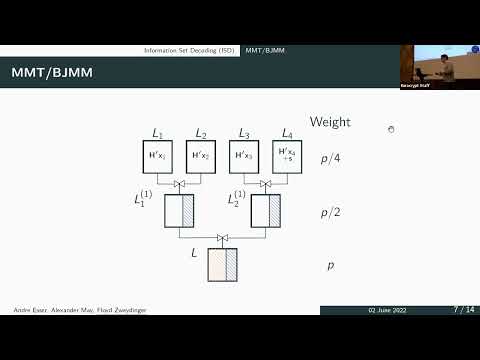CryptoDB
McEliece needs a Break -- Solving McEliece-1284 and Quasi-Cyclic-2918 with Modern ISD
| Authors: |
|
|---|---|
| Download: | |
| Presentation: | Slides |
| Conference: | EUROCRYPT 2022 |
| Abstract: | With the recent shift to post-quantum algorithms it becomes increasingly important to provide precise bit-security estimates for code-based cryptography such as McEliece and quasi-cyclic schemes like BIKE and HQC. While there has been significant progress on information set decoding (ISD) algorithms within the last decade, it is still unclear to which extent this affects current cryptographic security estimates. We provide the first concrete implementations for representation-based ISD, such as May-Meurer-Thomae (MMT) or Becker-Joux-May-Meurer (BJMM), that are parameter-optimized for the McEliece and quasi-cyclic setting. Although MMT and BJMM consume more memory than naive ISD algorithms like Prange, we demonstrate that these algorithms lead to significant speedups for practical cryptanalysis already for cryptographic instances of medium security level (around 60 bit). More concretely, we provide data for the record computations of McEliece-1223 and McEliece-1284 (old record: 1161), and for the quasi-cyclic setting up to dimension 2918 (before: 1938). Based on our record computations we extrapolate to the bit-security level of the proposed BIKE, HQC and McEliece parameters in NIST's standardization process. For BIKE/HQC, we also show how to transfer the Decoding-One-Out-of-Many (DOOM) technique to MMT/BJMM. Although we achieve significant DOOM speedups, our estimates confirm the bit-security levels of BIKE and HQC. For the proposed McEliece round-3 parameter sets of 192 and 256 bit, however, our extrapolation indicates a security level overestimate by roughly 20 and 10 bits, respectively, i.e., the high-security McEliece instantiations may be a bit less secure than desired. |
Video from EUROCRYPT 2022
BibTeX
@inproceedings{eurocrypt-2022-31874,
title={McEliece needs a Break -- Solving McEliece-1284 and Quasi-Cyclic-2918 with Modern ISD},
publisher={Springer-Verlag},
author={Andre Esser and Floyd Zweydinger and Alexander May},
year=2022
}

